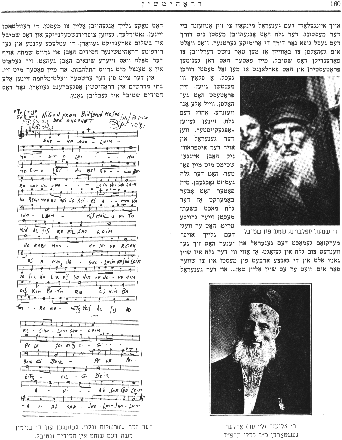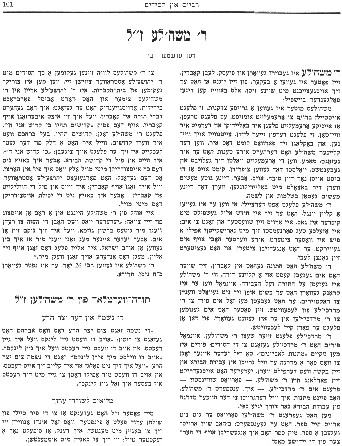Previous Page
|
Next Page

[Page 160]
The following week the official arrived in Drohitchin with the priest and Rothstein. My father also invited General Minkov to attend the proceedings. The priest began measuring through the surrounding gardens instead of through the alley itself. Doing it this way would help him justify not allowing the completion of the construction of the shtibel. My father then protested, and insisted that the measurement be made through the alley, where people walk. His protest was helpful, and although those present, except for the priest, had already been bribed. When General Minkov and the Kobrin police official agreed with my father, the priest had to give in. My father noticed, however, that they priest was using long steps during his measurements, and reported this to the General, who told the priest that since he, the priest, was already elderly, and since measuring was too difficult for him, the General would do the measuring himself. The General started doing the measuring himself.
The results were satisfactory, and the new shtibel was completed. The handful of lonely and persecuted Drohitchin chassidim were overjoyed at the defeat of their enemies, and the chassidim, including my father, started dancing for joy. During World War I, all the Houses of Study in Drohitchin, except for the chassidic one, burned down.
[Photos:] R. Shimon Eppelbaum, the custodian of the shtibel.
R. Eliezer (Leizer) Adler, who died on Kislev 22 [Nov. 30], 1923.
[Song sheet:] The Sabbath melody She-Hashalom Shelo [Peace that is His], sung by R. Binyamin Moshe the ritual slaughterer of the shtibel.

[Page 161]
RABBI MOSHELE
The first rebbe
R. Moshele was born in Piesk, near Kobrin, the son of a baker, and was an outstanding person since his youth, as illustrated by the following story:
Moshele's mother was a very righteous woman who used to distribute bread to the poor for free. It happened that some of the poor people would insult her, and thereby hurt her feelings. She suffered from this a great deal, and would cry and complain why they were doing this to her. When little Moshele heard her, he said, “Mama, if the poor had praised and blessed you, you would have been happy. This would mean that you did your charity for a favor. However, if your good acts are repaid by suffering, this means that your actions were totally for the sake of Heaven.”
R. Moshele often said that when he was small he was once playing with other children in the street during the month of Elul preceding Rosh Hashanah. His sister asked him why during such a holy period he was involved in foolishness, since even fish in the sea tremble during those days. Her words had their desired effect, and he started trembling too. This remained with him his whole life.
R. Moshele got married in Kobrin. His father-in-law provided him with a small meals and an apartment, where he spent his time in study and worship. There was an occasion when he became ill, and refused to go to a doctor. Instead, he asked to be taken to R. Mordechale of Lechovitch. His father took him to R. Mordechale, and he recovered from his illness. From then on, he always went to Lechovitch.
R. Mordechale respected R. Moshele enormously. One Purim, R. Mordechale told his chassidim that since on Purim one must give gifts to the needy, each person should indicate what spiritual level he wanted to achieve, and this would be granted to him. Everyone indicated his request except for R. Moshele, who said he hated gifts, and that spiritual levels should only be attained by hard work.
He was asked why he doesn't write a book. R. Moshele responded that he already had, and it was written on the hearts of the Jewish masses. Many chassidim, including R. Yehoshuale Ostrover attended R. Moshele's funeral. Upon returning from the cemetery, R. Yehoshuale went into R. Moshele's room and spent some time there in solitude. When he left, he said,
“I have heard Torah teachings in Kobrin, and now I will repeat it about Kobrin itself. With regard to the biblical verse “You shall be holy for I am holy” R, Moshele used to comment You shall be holy – this means that the Jewish People shall be holy without a choice to the contrary because they have a spark of divinity within. The words for I am holy then refer to a person saying that he knows and feels the holiness of the Creator, but does not have the means to verbally express what he feels in his heart.” This is what R. Yehoshuale said about Kobrin Chassidism – that he knew and felt the holiness of Kobrin Chassidism, but couldn't express it in words.
At structure over the grave of R. Moshele, there is a framed copy of his will: “I will take revenge against any person who dares to exaggerate about me in a good way. However, anyone may say that I was a person who loved the Jewish People because I said that about myself too. Therefore anyone else may say the same thing.”
R. Moshele was rebbe for 26 years. He died on 28 Nisan [April 30] 1851.
Torah Teachings of R. Moshele
The Soul and the Evil Inclination
“The soul tells the Evil Inclination what Abraham told his nephew, Lot: If you go to the left, I'll go to the right. If you go to the right, I'll go to the left. So the soul is saying, if you want to take me to the left, I won't follow you, and I'll go to the right. And if you even advise me to go with you to the right, it'll be better for me to go to the left.
Comments to the Shulchan Aruch [Code of Jewish Law]
My father thought there was a fifth part missing to the other four parts of the Shulchan Aruch. This part would be to teach a person how to deal with humans. I think there is a sixth part that is also missing: how to deal with inhuman people.
Previous Page
|
Next Page
This material is made available by JewishGen, Inc.
and the Yizkor Book Project for the purpose of
fulfilling our
mission of disseminating information about the Holocaust and
destroyed Jewish communities.
This material may not be copied,
sold or bartered without JewishGen, Inc.'s permission. Rights may be
reserved by the copyright holder.
JewishGen, Inc. makes no representations regarding the accuracy of
the translation. The reader may wish to refer to the original material
for verification.
JewishGen is not responsible for inaccuracies or omissions in the original work and cannot rewrite or edit the text to correct inaccuracies and/or omissions.
Our mission is to produce a translation of the original work and we cannot verify the accuracy of statements or alter facts cited.
 Drogichin, Belarus
Drogichin, Belarus
 Yizkor Book Project
Yizkor Book Project
 JewishGen Home Page
JewishGen Home Page
Yizkor Book Director, Lance Ackerfeld
This web page created by Lance Ackerfeld
Copyright © 1999-2025 by JewishGen, Inc.
Updated 13 Dec 2001 by LA

 Drogichin, Belarus
Drogichin, Belarus
 Yizkor Book Project
Yizkor Book Project
 JewishGen Home Page
JewishGen Home Page